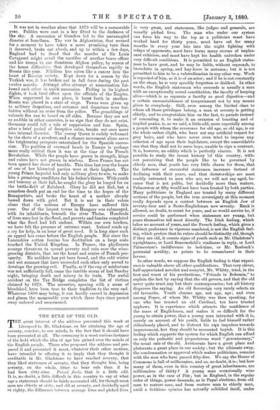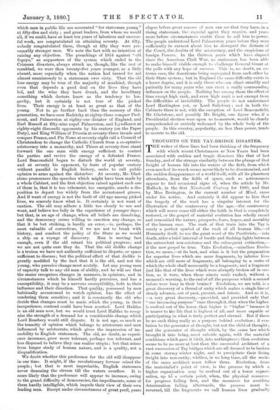THE RULE OF THE OLD.
is very great, and statesmen, like judges and generals, are usually picked lives. The man who under our system can force his way to the top as a politician must have worked hard for thirty years, must have sat for many months in every year late into the night fighting with relays of opponents, must have borne many storms of unplea- sant criticism, and must have kept his health unbroken under very difficult conditions. It is permitted to an English states- man to have gout, and lie may be liable, without reproach, to bronchitis in spring, and hay-fever in autumn; but it is not permitted to him to be a valetudinarian in any other way. Work is expected of him, as it is of an actor; and if he is not constantly on the stage, he is very speedily forgotten or disliked. In other words, the English statesman who succeeds is usually a man with an exceptionally sound constitution, the faculty of keeping alive—which is as separate a faculty as good digestion—and a certain unweariableness of temperament not by any means given to everybody. Still, even among the limited class to whom all those privileges belong, a man at seventy is getting elderly, and to congratulate him on the fact, to parade instead of concealing it, to make it an occasion of boasting and of implied praise, is, as we said, a little odd, more especially among a people with whom the reverence for old age, as old age, is on the whole rather slight, who have not any artificial respect for grey hairs, and who have never even tried to impose any criterion of age upon their legislators, except the unavoidable one that they shall not be mere boys, unable to sign a contract. It is, however, an oddity which is perfectly sincere. It is not possible to study the recent history of this country, with- out perceiving that the people like to be governed by elderly men, that youth has very little charm for them, that the influence of successful statesmen increases instead of declining with their years, and that dictatorships are most readily entrusted to men who are, we will not say aged, be- cause that is not polite, but decidedly more than mature. Palmerston at fifty would not have been trusted by both parties. Many politicians in England are trusted by many different sections of the people, but the true sovereignty at this moment really depends upon a contest between an English Jew of seventy-four and a Scoto-Englishman now seventy. Rank is allowed, no doubt, to count for years, and so would service be, if service could be performed when statesmen are young, but years themselves tell most directly. The Irish feeling, which takes no account of years, and the French feeling, which gives a distinct preference to vigorous manhood, is not the English feel- ing, which prefers that its rulers should be distinctly old, though if they are old, it counts signs of youth such as Mr. Gladstone's uprightness, or Lord Beaconsfield's readiness in reply, or Lord Palmerston's indifference to bed-time, or Mr. Roebuck's perennial acridity, as points to be remembered in their favour.
In other words, we suppose the English feeling is that experi- ence is valuable above all other qualifications. That very clever, half-appreciated novelist and essayist, Mr. Whitty, tried, in the best and worst of his productions, "Friends in Bohemia," to explain the fact by saying that the old govern, and that the old never quite trust any but their contemporaries; but all history disproves the saying. An old Sovereign very rarely selects an old favourite. Youth charms age, not age, age ; and even among Popes, of whom Mr. Whitty was then speaking, for one who has trusted an old Cardinal, ten have trusted nephews. It is experience which attracts the confidence of the mass of Englishmen, and makes it so difficult for the young to attain power, that a young man intrusted with it is, merely on account of his youth, liable to feel himself rather ridiculously placed, and to distrust his ovin impulses towards improvement, lest they should be accounted boyish. It is this feeling which supports the system for which English can afford us only the pedantic' and preposterous word " gerontocracy," the usual rule of the old. Aristocrats have a great place and. plutocrats a great place in our society ; but the ultimate sway, the condemnation or approval which makes politicians, remains with the men who have passed fifty-five. We say the House of Commons is full of millionaires, and so, no doubt, it is ; but how many of them, even in this country of great inheritances, are millionaires of thirty A young man occasionally wins power, as in the case of Pitt ; but in England, in the regular order of things, power descends, as in Papal elections, from old man to mature man, and from mature man to elderly man., until a fictitious opinion has actually solidified itself, under
which men in public life are accounted "for statesmen young" at fifty-five and sixty ; and great leaders, from whom we would all, if we could, have at least ten years of laborious and success- ful work, are congratulated on attaining seventy. At fifty, nobody congratulated them, though at fifty they were pre- sumably stronger men. We note the fact with no intention of raising any objection. The preachings of 1854 against "old fogeys," as supporters of the system which ended in the Crimean disasters, always struck us, though, like the rest of mankind, we were then twenty-five years younger, as a little absurd, more especially when the nation had turned for aid almost unanimously to a statesman over sixty. That the old lose energy may be true of the majority of mankind, though even that depends a good deal on the lives they have led, and the wine they have drunk, and the hereditary something which doctors know as the tendency to lon- gevity, but it certainly is not true of the picked lives. Their energy is at least as great as that of the young. Not to go further back than the memory of this generation, we have seen Radetsky at eighty-three conquer Pied- mont, and Palmerston at eighty-one dictator of England, and Earl Russell at fifty-nine expel Palmerston, and Lyndhurst at eighty-eight discomfit opponents by his oratory (on the Paper Duty), and King William of Prussia at seventy-three invade and conquer France, and Pio Nono at seventy-eight call a Council of Christendom to change the Catholic Church from a co-optative aristocracy into a monarchy, and Thiers at seventy-four stand forward the one man with energy sufficient to control the parties and revive the energy of a defeated France. Lord Beaconsfield began to disturb the world at seventy, and at seventy his opponent, by feats of popular oratory without parallel in English history, seeks to call public opinion to arms against the disturber. At seventy, Mr. Glad- stone pronounces the speeches which might have been made by a whole Cabinet, and the first objection raised against each one of them is, that it is too vehement, too energetic, marks a dis- position to depart too widely from the accustomed groove. And if want of energy is not the fault of old age among picked lives, we scarcely know what is. It certainly is not want of caution. The old may adhere a little too closely to use and wont, and believe too fully in the experience of younger days; but that, in an age of change, when all beliefs are dissolving, and the democracy seems willing to sanction any change, so that it be but striking, is hardly an error,—is, perhaps, the most valuable of correctives, if we are not to break with history, and conduct the policy of the State as we would a ship on a voyage of discovery. Man is moving fast enough, even if the old retard his political progress ; and we are not quite sure they do. That the old dislike change is a truism we have not authority sufficient to dispute, or space sufficient to discuss ; but the political effect of that dislike is greatly modified by the fact that it is the old, and not the young, who perceive change most acutely. Let any young man of capacity talk to any old man of ability, and he will see that the senior recognises changes .in manners, in opinions, and in circumstances which he himself hardly perceives, and has a susceptibility, it may be a nervous susceptibility, both to their influence and their direction. That quality, possessed by men habitually accustomed to watch opinion, has the effect of rendering them sensitive ; and it is constantly the old who decide that changes must be made ,which the young, in their inexperience, contend could have been averted. Lord Halifax is an old man now, but we would trust Lord Halifax to recog- nise the strength of a demand for a considerable change which Lord Rosebery would still dispute. It is not age, so much as the tenacity of opinion which belongs to aristocrats and men influenced by aristocrats, which gives the impression of im- mobility to English statesmen. The old, no doubt, as experi- ence increases, grow more tolerant, perhaps too tolerant, and less disposed to believe they can realise utopia ; but that arises from longer study of human nature, and is a quality, not a disqualification.
We doubt whether this preference for the old will disappear in our time. It might, if the revolutionary fervour seized the people ; bat that is most improbable, English statesmen never damming the stream till the waters overflow. It is more likely that the preference will appear to increase, owing to the grand difficulty of democracies, the impediments, some of them hardly intelligible, which impede their view of their own leading men. Except under circumstances of great peril, years elapse before great masses of men can see that they have, in a rising statesman, the especial agent they .require, and years. more before circumstances enable them to call him to power. The people understood Lord Palmerston years before they were sufficiently in earnest about him to disregard the distaste of the Court, the doubts of the aristocracy, and the suspicions of foreign Powers. In the thirteen years which have elapsed since the American Civil War, no statesman has been able to make himself visible enough to challenge General Grant at the polls with any hope of success. This is, no doubt, an ex- treme case, the Americans being segregated from each other by their State system ; but in England the same difficulty exists in a lesser degree, and it is only those who can climb steadily and patiently for many years who can exert a really commanding influence on the people. Nothing has among them the effect of time except high rank, and even high rank is not exempt from the difficulties of invisibility. The people do not understand Lord Hartington yet, or Lord Salisbury ; and in both the Cabinets there is not, with the exception of Lord Beaconsfield, Mr. Gladstone, and possibly Mr. Bright, one figure who, if a Presidential election were upon us to-morrow, would be clearly comprehended or entirely welcomed by the whole body of the people. In this country, popularity, no less than power, tends to accrete to the old.











































 Previous page
Previous page